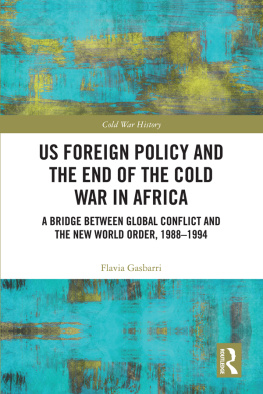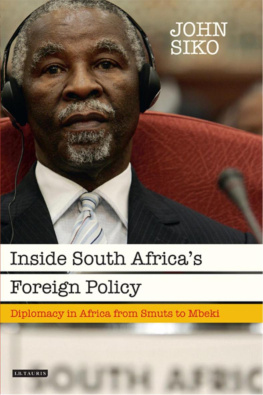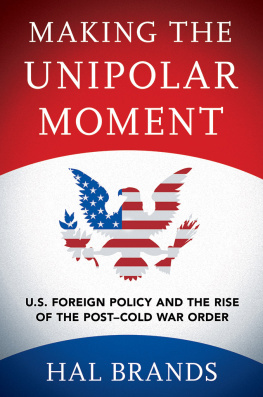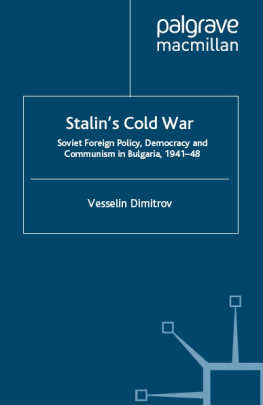US Foreign Policy and the End of the Cold War in Africa
This book investigates the end of the Cold War in Africa and its impact on post-Cold War US foreign policy in the continent.
The fall of the Berlin Wall is widely considered the end of the Cold War; however, it documents just one of the many ends, since the Cold War was a global conflict. This book looks at one of the most neglected extra-European battlegrounds, the African continent, and explores how American foreign policy developed in this region between the late 1980s and the early 1990s. Drawing on a wide range of recently disclosed documents, the book shows that the Cold War in Africa ended in 1988, preceding the fall of the Berlin Wall. It also reveals how, since then, some of the most controversial and inconsistent episodes of post-Cold War US foreign policy in Africa have been deeply rooted in the unique process whereby American rivalry with the USSR found its end in the continent. The book challenges the traditional narrative by presenting an original perspective on the study of the end of the Cold War and provides new insights into the shaping of US foreign policy during the so-called unipolar moment.
This book will be of much interest to students of Cold War history, US foreign policy, African politics and international relations.
Flavia Gasbarri is Lecturer in War Studies, Co-chair of the Africa Research Group and a member of the Centre for Grand Strategy at the War Studies Department, Kings College London, UK.
Cold War History
Series Editors: Odd Arne Westad
John F. Kennedy School of Government, USA
Michael Cox
London School of Economics & Political Science, UK
In the new history of the Cold War that has been forming since 1989, many of the established truths about the international conflict that shaped the latter half of the twentieth century have come up for revision. The present series is an attempt to make available interpretations and materials that will help further the development of this new history, and it will concentrate in particular on publishing expositions of key historical issues and critical surveys of newly available sources.
New Perspectives on the End of the Cold War
Unexpected Transformations?
Edited by Bernhard Blumenau, Jussi M. Hanhimki and Barbara Zanchetta
The Diplomacy of Dtente
Cooperative Security Policies from Helmut Schmidt to George Shultz
Stephan Kieninger
America and Romania in the Cold War
A Differentiated Dtente, 196980
Paschalis Pechlivanis
The Greek Junta and the International System
A Case Study of Southern European Dictatorships, 196774
Edited by Antonis Klapsis, Constantine Arvanitopoulos, Evanthis Hatzivassiliou and Effie G. H. Pedaliu
Secrecy, Public Relations and the British Nuclear Debate
How the UK Government Learned to Talk about the Bomb, 197083
Daniel Salisbury
US Foreign Policy and the End of the Cold War in Africa
A Bridge between Global Conflict and the New World Order, 19881994
Flavia Gasbarri
For more information about this series, please visit: www.routledge.com/Cold-War-History/book-series/SE0220
First published 2020
by Routledge
2 Park Square, Milton Park, Abingdon, Oxon OX14 4RN
and by Routledge
52 Vanderbilt Avenue, New York, NY 10017
Routledge is an imprint of the Taylor & Francis Group, an informa business
2020 Flavia Gasbarri
The right of Flavia Gasbarri to be identified as author of this work has been asserted by her in accordance with sections 77 and 78 of the Copyright, Designs and Patents Act 1988.
All rights reserved. No part of this book may be reprinted or reproduced or utilised in any form or by any electronic, mechanical, or other means, now known or hereafter invented, including photocopying and recording, or in any information storage or retrieval system, without permission in writing from the publishers.
Trademark notice: Product or corporate names may be trademarks or registered trademarks, and are used only for identification and explanation without intent to infringe.
British Library Cataloguing-in-Publication Data
A catalogue record for this book is available from the British Library
Library of Congress Cataloging-in-Publication Data
Names: Gasbarri, Flavia, 1984 author.
Title: US foreign policy and the end of the Cold War in Africa : a bridge
between global conflict and the new world order, 19881994 / Flavia
Gasbarri.
Other titles: Cold War history series.
Description: Abingdon, Oxon ; New York, NY : Routledge, 2020. | Series:
Cold War history | Includes bibliographical references and index.
Identifiers: LCCN 2020003140 (print) | LCCN 2020003141 (ebook) |
ISBN 9780367862909 (hardback) | ISBN 9781003018209 (ebook)
Subjects: LCSH: Cold War. | AfricaForeign relationsUnited States. |
United StatesForeign relationsAfrica. | AfricaPolitics and
government19451960. | AfricaPolitics and government1960 |
United StatesForeign relations19451989.
Classification: LCC DT38.7 .G37 2020 (print) | LCC DT38.7 (ebook) |
DDC 327.6073dc23
LC record available at https://lccn.loc.gov/2020003140
LC ebook record available at https://lccn.loc.gov/2020003141
ISBN: 978-0-367-86290-9 (hbk)
ISBN: 978-1-003-01820-9 (ebk)
Typeset in Times New Roman
by Apex CoVantage, LLC
The future competition with the United States will take place not in Europe, and not in the Atlantic Ocean directly. It will take place in Africa, and in Latin America. We will compete for every piece of land, for every country.
This statement was uttered in 1965 by Jurij Vladimirovi Andropov, later to become general secretary of the Communist Party of the Soviet Union. While the competition eventually took place on many fronts, from a nuclear race to a propaganda war, it is true that Africa and Latin America, together with other areas of what became known as the Third World,
This coreperiphery interaction was particularly evident during the 1970s when the two superpowers started a phase of dtente. While the relaxation of tensions between Washington and Moscow focused mostly on arms control and led to the Strategic Arms Limitation Talks I (SALT I) and to the signing of the corresponding treaty in 1972, the superpowers policies and interventions in the Third World continued to give rise to harsh disagreements. In this sense, therefore, the more the tensions eased with regard to the core issues, the more the conflict spread in the periphery. As observed by John Gaddis, the Soviets made no secret of their view that dtente did not mean an end to SovietAmerican competition in the third world, only an agreement that such rivalries would not be allowed to escalate to dangerous levels. These divergences of perspective between the two superpowers in the application of rules of conduct in the Third World contributed to the collapse of dtente and to another exacerbation in Cold War tensions at the beginning of the 1980s.
Consequently, when the rise of Mikhail Gorbachev in the USSR and the beginning of the ReaganGorbachev summits launched a new dtente in the second half of the 1980s that marked the final years of the Cold War, the resolution of the regional conflicts became one of the issues discussed in their dialogue. Both superpowers made a significant effort to settle these ongoing proxy wars in the periphery in order to avoid repeating the same problems that had undermined their dtente in the 1970s.






